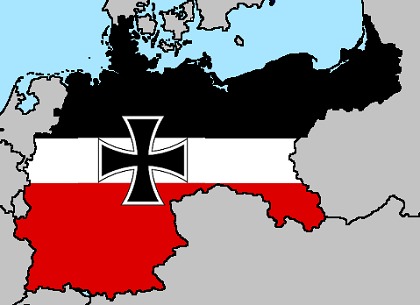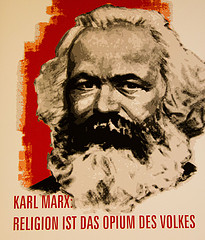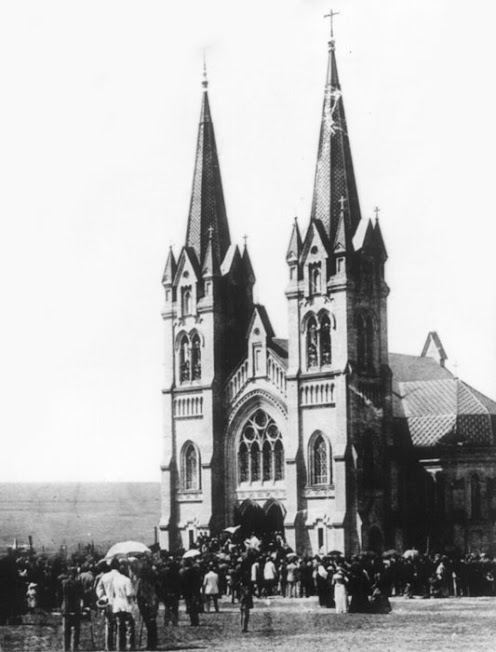We Must Tear Down the Old Order - "Critique of Hegel's Philosophy of Right" by Karl Marx
Contribution to the Critique of Hegel's Philosophy of Right
This is an earlier essay by Marx from 1843 which was meant to serve as an introduction to a larger work on Hegel which he had not written yet. In the essay he applies his radical "humanist" theory of his new view of human society and seeks to assess Germany's readiness to take on such a mantle. Central to this new "humanism" is the rejection of religion, a rejection of the old structures and social categories of society, and the adoption of a new narrative of victim - oppressor.
 |
| Second Reich of Germany - 1871 - 1918 |
Religion as the Primary Alienation of Man
Marx opens this essay with a discussion on religion. If Communism is about tearing down that which alienates man, Marx says that there is no greater criticism that can be had than a criticism against religion. Why? Well it is religion that convinces man that he is to live for Heaven, to seek after God. The criticism of religion is the criticism of the spiritual world. The spiritual world is an inversion of man. Instead of it shaping man and society, rather Marx holds, it is society who created religion. Religion, therefore, is just really like a catalogue of human thoughts, sufferings, desires, hopes, etc. which are projected onto a fake being. And so, there is no metaphysical reality which binds or guides man, man has no such essence. 1 "It is the fantastic realization of the human being insomuch as the human being possesses no true reality. The struggle against religion is, therefore, indirectly a struggle against that world whose spiritual aroma is religion." 2
If there is one human reality that religion captures and projects especially, it is that of man's alienated state, his suffering, his abused condition. The problem, though, is that religion is like a drug, keeping man asleep and away from fixing his condition, numbing him into acceptance of it. To truly wish happiness on someone then is to call them to wake up and abandon this opiate, to abandon religion and to end their suffering here on this earth. Marx uses the imagery of an iron chain covered in flowers which weighs man down. It appears nice and lovely, but in reality is a massive burden which needs to be overthrown. This is the first overthrowing that needs to take place in society in order to continue to overthrow the more earthly elements that alienate man from himself - politics, law, economics-. 3 "Religion is only the illusory sun about which man revolves so long as he does not revolve about himself. It is the task of history, therefore, once the other-world of truth has vanished, to establish the truth of this world." 4
Having established this basic fact of human alienation, he turns his attention to the specifics of Hegel's Elements of a Philosophy of Right, which is an analysis of the development of man's political and moral understanding of himself and the movement of history towards implementing this development. Marx takes some time to assess claims about the nature of Germany and its own historical development. [I am going to skip parts of this and focus more on the parts of the essay that deal specifically with Marx's understanding of religion and humanity.] 5
...
Germany's Ideals and Practice Are Out of Sync
Eventually Marx comes to his usual critique of Hegel, which is that theory and abstract reason is an inversion of what needs to happen. Progress is to move away from theories toward practical action, towards "... tasks which can only be solved by means of practical activity." How does one make the transition, though, from theory to practice? Well Marx says that theory can grab hold of man when it is shown to be at the service of mankind. It is a radical turn inward of everything towards mankind on earth. Here radical meaning to grasp every aspect of society by its roots and point it towards the earthly service of man. With this being clear, enemy number one of this process is religion. Religion keeps man's mind on the life to come, has his final destiny in a place other than earth. 6 "What proves beyond doubt the radicalism of Germany theory, and thus its practical energy, is that it begins from the resolute positive abolition of religion. The criticism of religion ends with the doctrine that man is the supreme being for man. It ends, therefore, with the categorical imperative to overthrow all those conditions in which man is abased, enslaved, abandoned, contemptible being ..." 7
Marx then goes on to make a comparison to the Protestant Reformation. The Reformation, he said, turned the tables on Christianity and Catholicism. Instead of rituals and duties guiding the physical acts of worship, Luther inverted it and made everything about the spirit. Just like Luther's inversion, in this new revolution Germany will invert the world by emancipating the people over the ruling classes. It will invert property from the rich and private, to the universal and public. The revolution will shatter the current state of political affairs. 8 Marx is sad, though, that Germany - advancing so far in theory - is so far behind in actual practice. And he doesn't that there is the material conditions on the ground, so to speak, for a revolution to take hold and begin the real life transformation. The German political status quo is still stuck in the past. 9
If the revolution is to happen, then it would have to be a take over by a class of people in society to which all are allowed to belong. A class which can represent the German man as a whole. 10 But for this underclass to become the whole, it needs another class to represent all the evils from which it is emancipating itself. There needs to be an oppressor class. 11 "For one class to be the liberating class par excellence, it is necessary that another class should be openly the oppressing class. The negative significance of the French nobility and clergy produced the positive significance of the bourgeoisie..." 12 Marx thinks that Germany still has not met the conditions for this to happen because there are too many narrow classes in German society. There is a hierarchy in which many classes are not just interacting with the class above it, but fending off the class below it. This prevents a mass take over and categorization of oppressor vs. oppressed. 13 The theoretical and practical life of Germany is too far separated from one another.
Marx's Suggestions for the Germans
What's the response then? Well Marx says that the previous structures of society need to be completely torn down such as to create a universal class, with universal problems and grievances, in which there can be no solution in the current system to redress the problem, and thus giving the impetus for the destruction of the whole thing. This would be the reduction of all lower classes in the oppressed proletariat. 14 "...a sphere, finally, which cannot emancipate itself without emancipating itself from all other spheres of society, without, therefore, emancipating all these other spheres, which is, in short, a total loss of humanity and which can only redeem itself by a total redemption of humanity. This dissolution of society, as a particular class, is the proletariat." 15
When the old order has been overthrown and the new radical structures of society have taken hold, then for the proletariat to claim right to land has the same weight as the king previously did in the old structure. It's about who has the power of the structure in place. 16 "Thus the proletarian has the same right, in relation to the new world which is coming into being, as the German King has in relation to the existing world when he calls the people his people or a horse his horse." 17
To conclude, Marx sums up his [sometimes scattered] thoughts at the end of the essay. Here is how he brings it all together. "Lust us sum up these results. The emancipation of Germany is only possibly in practice if one adopts the point of view of that theory according to which man is the highest being for man. Germany will not be able to emancipate itself from the Middle Ages unless it emancipates itself at the same time from the partial victories over the Middle Ages. In Germany no type of enslavement can be abolished unless all enslavement is destroyed. Germany, which likes to get to the bottom of things, can only make a revolution which upsets the whole order of things. The emancipation of Germany will be the emancipation of man. Philosophy is the head of this emancipation and the proletariat is its heart. Philosophy can only be realized by the abolition of the proletariat, and the proletariat can only be abolished by the realization of philosophy." 18
------------------
1 - Marx, Karl. Karl Marx: Early Writings. Critique of Hegel's Philosophy of Right. Trans. and Ed. by T.B. Bottomore (McGraw Hill. NY, 1963) Pg. 43.
2 - 43
3 - 44
4 - 44
5 - 45
6 - 52
7 - 52
8 - 53
9 - 54
10 - 55
11 - 56
12 - 56
13 - 56, 57
14 - 58
15 - 58
16 - 59
17 - 59
18 - 59






Comments
Post a Comment